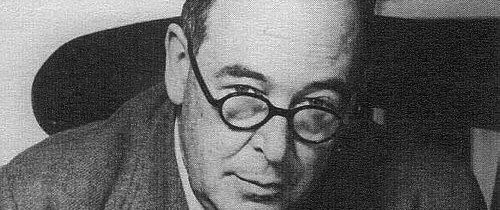Back to series
The Reluctant Convert
The Gift of Hospitality
Lewis Shares His Time and Talent
Endlessly Generous



The Generous Heart and Life of C.S. Lewis
Click here to open a Print - Friendly PDF
C.S. Lewis’s classic The Lion, the Witch and the Wardrobe begins,
Once there were four children whose names were Peter, Susan, Edmund and Lucy. This story is about something that happened to them when they were sent away from London during the war because of the air-raids. They were sent to the house of an old Professor who lived in the heart of the country . . . He had no wife and he lived in a very large house with a housekeeper . . . and three servants.1
What Lewis doesn’t tell the reader is that in real life he was the generous old (middle-aged) professor who opened up his home near Oxford to provide shelter and care for children who were evacuated from London and other cities during the German air raids of World War II. This act of hospitality was in part the inspiration behind the Chronicles of Narnia and is just one example of the kindness that permeated the life of C.S. Lewis, a generous follower of Christ.
The Reluctant Convert
In Lewis’s earlier years, generous probably wouldn’t have been the word used to describe the erudite young scholar. Some who knew him in those days might have preferred the word smug. His pride came to him naturally out of a brilliant mind, hardened on the battlefields of World War I and acclaimed through academic success. In the 1920s he finished his student years at Oxford with a rare “triple first,” graduating with first-class honors in three different disciplines, philosophy, classics, and English language and literature. He won the Chancellor’s Prize for an English essay. And he began lecturing at Oxford and published his first book, Dymer, a poem in rhyme royal, all by the age of twenty-eight. Lewis was eloquent, quick on his feet, and ready to ride roughshod over others in debate with his sarcasm and satirical wit.
His prideful ways, however, were tempered as he began his search for truth and meaning in life. This quest, chronicled in his book Surprised by Joy, eventually came to a crisis point: “That which I greatly feared had at last come upon me. In the Trinity term of 1929 I gave in, and admitted that God was God, and knelt and prayed: perhaps that night, the most dejected and reluctant convert in all England.”2 Lewis soon would wholeheartedly commit his life to serving Jesus Christ as Lord. One of the first fruits of his conversion was the generosity that began to exude from Lewis. As he studied the Scriptures, he came to the conclusion that it truly is “better to give than to receive.”
The Gift of Hospitality
Hospitality, a natural trait of Lewis’s generosity, expanded as his faith grew. Lewis had been supported by his father, Albert Lewis, through all of his student years at Oxford. Upon employment as an Oxford don or professor, Lewis was finally able to support himself, although the salary of a don was meager. On a modest income, he was also providing food and shelter for Mrs. “Jane” Moore, the mother of his deceased war buddy, Paddie Moore. Mrs. Moore’s daughter, Maureen, also lived with them. Lewis had made a pact with Paddie that if either of them were killed in the war, the survivor would take care of the other’s family. True to his word, Lewis ended up caring for Mrs. Moore for the rest of her life. With little money to spare, Lewis lived a simple life.

Upon the death of their father, C.S. Lewis and his brother, Warnie, pooled their inheritance and purchased a home in Headington Quarry, just outside of Oxford. There, at “The Kilns,” the Lewis brothers, both single, lived with Mrs. Moore and her daughter. The Kilns became a place of generous hospitality. For thirty years Lewis cared tenderly and tirelessly for Mrs. Moore at The Kilns until she died, often doing dishes, laundry and other household chores for her, even as he managed to write his books and do his scholarly work.
After the Germans invaded Poland, the Lewis brothers opened up The Kilns to children forced to evacuate the big cities. The first group was four school girls, and throughout the war several other groups of children came in and out of their home. The highlight during this time was a delightful sixteen-year-old named June Flewett. She brought much fun and laughter to the household. The Lewises’ gift of hospitality was being reciprocated by the gift of joy that emanated from this young lady.
In his later years Lewis opened his home to a brash, gifted, divorced, Jewish American follower of Jesus, Joy Gresham Davidman, and her two sons. This relationship, retold in the movie Shadowlands, once again highlights Lewis’s hospitality. After spending time with Joy’s sons, David and Douglas, Lewis wrote humorously in a letter to his friend Ruth Pitter, “I never knew what we celibates are shielded from. I will never laugh at parents again. Not that the boys weren’t a delight: but a delight like surf-bathing which leaves one breathless and aching. The energy, the tempo, is what kills.”3
Eventually Lewis married Joy in a civil ceremony, so she could gain British citizenship and remain in the United Kingdom. Though he did this out of his generous spirit, this friendship over time led to romantic love; Lewis and Joy were married by a priest in the hospital where Joy was battling cancer. After only four years of marriage, Joy succumbed to the ravages of cancer and died. Grief stricken, Lewis wrote one of the most powerful books ever written on grief, A Grief Observed. This didn’t stop him, however, from continuing to raise Joy’s two sons, David and Douglas, paying for their education and including them in his estate.
C.S. Lewis’s hospitality was one that permeated his life and blessed many people.
Lewis Shares His Time and Talent
A second area of generosity evident in Lewis was his gift of time to others. Austin Farrer, a close friend of Lewis, remarked about Lewis’s “taking of the world into his heart.”4 Lewis was able to connect with people; he could make them feel that what they had to say was important and, more important, that they were of value. This came out in the amount of time Lewis spent communicating in various forms, from meeting with people for lunch and dinner regularly, following up with them by letter, and praying for them.
As his books became well-known, and as soon as he was discovered in America, Lewis began receiving fan mail, particularly from the English-speaking world. Lewis believed that it was his duty to reply to each letter. Eventually he would spend at least an hour every morning responding to letters. His brother, Warnie, would help him with the logistics of organizing and mailing the correspondence. These letters today provide wonderful insights into ways to live out the Christian faith in daily life, while giving us a glimpse into Lewis’s warm personality and sense of humor.
An amusing string of letters was written to an American named Dr. Warfield Firor, who regularly sent Lewis care packages of canned hams. Great Britain was still recovering from the war, so the specialty foods were greatly appreciated. Lewis received so much food from Americans that he gladly shared the spoils with others in town. His letters show not only that he could be generous himself, but also that he knew how to receive generosity with gratitude. For example, he writes to Dr. Firor, “The arrival of that magnificent ham leaves me just not knowing what to say. If it were known that it was in my house, it would draw every housebreaker in the neighbourhood more surely than would a collection of gold plate! . . . I am very deeply grateful to you for your great kindness.”5
In A Severe Mercy, Sheldon Vanauken tells how while a student at Oxford, Lewis would eat dinner with him and his wife, Davy, engaging in rich conversation well into the night. Through Lewis’s mentoring influence and openness, both Sheldon and Davy eventually were pointed toward receiving Christ’s mercy and grace.6
Endlessly Generous
 Finally, Lewis both preached and practiced his deep conviction that he was to use his material wealth to serve the needs of others. He writes in Mere Christianity, “Christ says ‘Give me All. I don’t want so much of your time and so much of your money and so much of your work: I want You.’”7 Lewis understood this to mean that all of his life was to be surrendered to God including how he used the money and other resources that had been given to him. He also realized the dangers of materialism. He writes in The Screwtape Letters, “Prosperity knits a man to the world. He feels that he is finding his place in it, while really it is finding its place in him.”8
Finally, Lewis both preached and practiced his deep conviction that he was to use his material wealth to serve the needs of others. He writes in Mere Christianity, “Christ says ‘Give me All. I don’t want so much of your time and so much of your money and so much of your work: I want You.’”7 Lewis understood this to mean that all of his life was to be surrendered to God including how he used the money and other resources that had been given to him. He also realized the dangers of materialism. He writes in The Screwtape Letters, “Prosperity knits a man to the world. He feels that he is finding his place in it, while really it is finding its place in him.”8
As Lewis’s books became popular, large royalties poured in. Rather than upgrade his lifestyle, Lewis decided to maintain his current standard of living and give the rest away. As he got paid for The Screwtape Letters, which were published in The Guardian, he instructed the newspaper to send the royalties to a Clergy Widows fund. He did the same with the BBC when they sent money for his radio broadcasts. This generosity got him into some trouble, however, when, after having given the money away, he learned that he owed taxes on it. One of Lewis’s weaknesses was math and numbers. One of the fortunate circumstances of Lewis’s life was that as a war veteran he was exempt from taking Oxford’s math entrance exam; some propose that he may not have passed the test. This should be encouraging to those who struggle with math to know that one of the world’s most brilliant men also didn’t care for numbers.
Fortunately for Lewis, his good friend and lawyer Owen Barfield set up a charitable trust for him called the Agape Fund. From then on, two-thirds of Lewis’s royalties were paid into the trust and distributed anonymously to many people, including those in poverty, clergy widows, seminary students, churches, and many other ministries. Lewis went to great lengths to ensure that his name would not be tied to any of the gifts. He detested the idea of conspicuous living, writing, “This must often be recognized as a temptation. Sometimes our pride also hinders our charity; we are tempted to spend more than we ought on the showy forms of generosity (tipping, hospitality) and less than we ought on those who really need our help.”9
Lewis also took great joy in giving spontaneously and with fun. In a letter to an American, he wrote,
It will not bother me in the hour of death to reflect that I have been “had for a sucker” by any number of impostors; but it would be a torment to know that one had refused even one person in need . . . Another thing that annoys me is when people say “Why did you give that man money? He’ll probably go and drink it.” My reply is “But if I’d kept [it] I should probably have drunk it.”10
This doesn’t mean that Lewis didn’t struggle with giving or worry about money. In fact, one of Lewis’s greatest fears was the idea of ending up in poverty. Following the writing of A Grief Observed, he became very worried about money. Hooper writes, Lewis “had spent so much over the last years that he now began keeping a minute account of his expenses.”11
It was from deep within his own personal experience that Lewis wrote, “For many of us the great obstacle to charity lies not in our luxurious living or desire for more money, but in our fear—fear of insecurity.”12 However, Lewis, in surrendering his life to Christ, consistently sought to overcome this insecurity by trusting God and giving generously, the antidote to fear, worry,
and materialism.
Lewis gave us some wise advice about how much we should give.
I do not believe one can settle how much we ought to give. I am afraid the only safe rule is to give more than we can spare. In other words, if our expenditure on comforts, luxuries, amusement, etc., is up to the standard common among those with the same income as our own, we are probably giving away too little. If our giving does not at all pinch or hamper us, I should say it is too small. There ought to be things we should like to do and cannot because our commitment to giving excludes them.13
 At the end of Lewis’s life, his total estate was worth only £37,772. Not a great deal considering the amount of money, royalties, that had passed through Lewis’s bank accounts, including his Agape Fund.
At the end of Lewis’s life, his total estate was worth only £37,772. Not a great deal considering the amount of money, royalties, that had passed through Lewis’s bank accounts, including his Agape Fund.
On December 7, 1963, at the memorial service for C.S. Lewis in the Chapel of Magdalen College, Oxford, Austin Farrar, Lewis’s good friend and pastor, said this about Lewis:
His characteristic attitude to people in general was one of consideration and respect. He did his best for them and he appreciated them. He paid you the compliment of attending to your words. He did not pretend to read your heart. He was endlessly generous. He gave without stint, to all who seemed to care for them, the riches of his mind and the effort of his wit: and where there was need, he gave his money. I will not say what I know about his charities. When he had entered into any relationship his patience and his loyalty were inexhaustible. He really was a Christian—by which I mean, he never thought he had the right to stop.14

Lewis’s model of generous living is an example for us today as we seek to follow the Lord Jesus Christ, who gave all for us and commanded us to “seek first the kingdom of God and his righteousness, and all these things shall be added to you” (Matt. 6:33 ESV).
| Notes 1. C.S. Lewis, The Lion, The Witch and the Wardrobe (1950; repr. New York: Harper Collins, 1994), 1. 2. C.S. Lewis, Surprised by Joy (London: Fontana, 1955), 182. 3. Walter Hooper, C.S. Lewis: A Complete Guide to His Life and Works (San Francisco: HarperSanFrancisco, 1996), 65. 4. Austin Farrer, “In His Image,” in C.S. Lewis at the Breakfast Table, ed. James Como. 5. C.S. Lewis, The Collected Letters of C.S. Lewis, ed. Walter Hooper (San Francisco: HarperSanFrancisco, 2004), 836. 6. Sheldon Vanauken, A Severe Mercy (New York: Harper Collins, 1977), 121. 7. C.S. Lewis, Mere Christianity, (1952; repr. New York: Touchstone, 1996), 169. 8. C.S. Lewis, The Screwtape Letters (1942; repr. New York: Macmillan, 1976), 130–131. 9 Lewis, Mere Christianity, 82. 10. C.S. Lewis, Letters to an American Lady (Grand Rapids: Eerdmans, 1967), 105–106 (October 26, 1962). 11. Hooper, C.S. Lewis, 102. 12. Lewis, Mere Christianity, 82. 13. Ibid. 14. Hooper, C.S. Lewis, 120. |
|||

Joel Woodruff
President, C.S. Lewis InstituteJoel Woodruff, President, C.S. Lewis Institute, has worked in higher education, “tent-making,” nonprofit administration, and pastoral ministries in Alaska, Israel, Hungary, France, and Northern Virginia. He served as Dean of Students, Chaplain, and Professor of Bible & Theology at European Bible Institute, where he helped train Europeans both for professional ministry and to be Christian leaders in the marketplace. Prior to joining the Institute, he was on the leadership team of Oakwood Services International, a nonprofit educational and humanitarian organization. He is a graduate of Wheaton College, earned his M.Div. from Gordon-Conwell Theological Seminary, and has a doctorate in Organizational Leadership from Nova Southeastern University. As a Parish-Pulpit Fellow, he studied Biblical Backgrounds & Archaeology in Israel for a year.

 COPYRIGHT: This publication is published by C.S. Lewis Institute; 8001 Braddock Road, Suite 301; Springfield, VA 22151. Portions of the publication may be reproduced for noncommercial, local church or ministry use without prior permission. Electronic copies of the PDF files may be duplicated and transmitted via e-mail for personal and church use. Articles may not be modified without prior written permission of the Institute. For questions, contact the Institute: 703.914.5602 or email us.
COPYRIGHT: This publication is published by C.S. Lewis Institute; 8001 Braddock Road, Suite 301; Springfield, VA 22151. Portions of the publication may be reproduced for noncommercial, local church or ministry use without prior permission. Electronic copies of the PDF files may be duplicated and transmitted via e-mail for personal and church use. Articles may not be modified without prior written permission of the Institute. For questions, contact the Institute: 703.914.5602 or email us.
-
Recent Podcasts
The Faith of Jonathan Edwards
by Aimee Riegert, Arthur W. Lindsley on November 1, 2024Jonathan Edwards has been described as the greatest...Read More
-
A Scientist’s Journey to God – Krister Renard’s story
by Krister Renard, Jana Harmon on October 25, 2024
-
The Faith of Francis Schaeffer
by Arthur W. Lindsley, Aimee Riegert on October 18, 2024
-
Recent Publications
Will You Be Ready?
by Thomas A. Tarrants on October 23, 2024Tom Tarrants gives insights on how we can...Read More
-
Should Christians Be Involved with Politics?
by Kerry A. Knott on October 1, 2024
-
Isn ’t Atheism Based on Scientific Fact Whereas Christianity is Based on “Faith”?
by Cameron McAllister on September 1, 2024
0
All Booked
0.00
All Booked
0.00
All Booked
23169
ADVENT CALENDAR: The Amazing Prophecies Fulfilled by the Birth of Jesus Christ
https://www.cslewisinstitute.org/?event=advent-calendar-the-amazing-prophecies-fulfilled-by-the-birth-of-jesus-christ&event_date=2024-11-28®=1
https://www.paypal.com/cgi-bin/webscr
2024-11-28

Next coming event
Days
Hours
Minutes
Seconds
ADVENT CALENDAR: The Amazing Prophecies Fulfilled by the Birth of Jesus Christ
On November 28, 2024 at 6:00 amCategories
Speakers

Joel Woodruff
President, C.S. Lewis Institute
Team Members

Joel Woodruff
President, C.S. Lewis InstituteJoel Woodruff, President, C.S. Lewis Institute, has worked in higher education, “tent-making,” nonprofit administration, and pastoral ministries in Alaska, Israel, Hungary, France, and Northern Virginia. He served as Dean of Students, Chaplain, and Professor of Bible & Theology at European Bible Institute, where he helped train Europeans both for professional ministry and to be Christian leaders in the marketplace. Prior to joining the Institute, he was on the leadership team of Oakwood Services International, a nonprofit educational and humanitarian organization. He is a graduate of Wheaton College, earned his M.Div. from Gordon-Conwell Theological Seminary, and has a doctorate in Organizational Leadership from Nova Southeastern University. As a Parish-Pulpit Fellow, he studied Biblical Backgrounds & Archaeology in Israel for a year.





